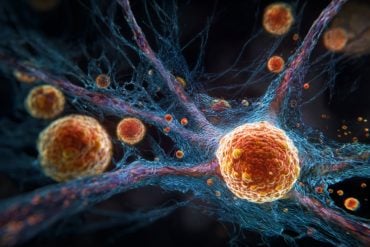Summary: Restricting access to food within a strict time frame stimulates autophagy and lowers levels of the huntingtin protein in the brain, a new mouse study reveals.
Source: University of British Columbia.
New research from the University of British Columbia suggests that following a strict eating schedule can help clear away the protein responsible for Huntington disease in mice.
Huntington disease (HD) is an inherited, progressive disorder that causes involuntary movements and psychiatric problems. Symptoms appear in adulthood and worsen over time. Children born to a parent with HD have a one in two chance of inheriting the disease, which is caused by a buildup of mutant huntingtin protein (mHTT).
In research published today, scientists stimulated autophagy–a process in which the cell cleans out debris and recycles cellular material such as proteins–by restricting access to food in mice with HD to a six-hour window each day. This led to significantly lower levels of mHTT in the brain.
“We know that specific aspects of autophagy don’t work properly in patients with Huntington disease,” said study lead author Dagmar Ehrnhoefer, who conducted the study while she was a researcher with the UBC Centre for Molecular Medicine and Therapeutics. “Our findings suggest that, at least in mice, when you fast, or eat at certain very regulated times without snacking in between meals, your body starts to increase an alternative, still functional, autophagy mechanism, which could help lower levels of the mutant huntingtin protein in the brain.”
The researchers also uncovered a clue in the mystery of why mice expressing a modified form of the HD gene show no HD symptoms. The genetic modification prevents the mHTT protein from being cut, or cleaved, at a specific site. These mice had higher rates of autophagy than mice with regular, cleavable mHTT, indicating that the cleavage site is important for regulating autophagy.
While current therapeutic strategies to lower mHTT are targeted at the Huntington disease gene, this new research suggests that another potential treatment approach is to stimulate autophagy, either through diet or the development of therapies that target the cleavage site.

Dale Martin, study co-author who conducted the research while he was a postdoctoral research fellow with the UBC Centre for Molecular Medicine and Therapeutics, said the findings demonstrate that seemingly small lifestyle changes could have an impact on HD.
“HD is a devastating disease with no cure available at this time,” said Martin. “More studies are needed, but perhaps something as simple as a modified dietary schedule could provide some benefit for patients and could be complementary to some treatments currently in clinical trials.”
Funding: Canadian Institutes of Health Research, Teva Pharmaceuticals funded this study.
Source: Thandi Fletcher – University of British Columbia
Publisher: Organized by NeuroscienceNews.com.
Image Source: NeuroscienceNews.com image is in the public domain.
Original Research: Open access research in Acta Neuropathologica Communications.
doi:10.1186/s40478-018-0518-0
[cbtabs][cbtab title=”MLA”]University of British Columbia “Strict Eating Schedule Can Lower Huntington’s Protein: Mouse Study.” NeuroscienceNews. NeuroscienceNews, 7 March 2018.
<https://neurosciencenews.com/huntingtin-eating-8596/>.[/cbtab][cbtab title=”APA”]University of British Columbia (2018, March 7). Strict Eating Schedule Can Lower Huntington’s Protein: Mouse Study. NeuroscienceNews. Retrieved March 7, 2018 from https://neurosciencenews.com/huntingtin-eating-8596/[/cbtab][cbtab title=”Chicago”]University of British Columbia “Strict Eating Schedule Can Lower Huntington’s Protein: Mouse Study.” https://neurosciencenews.com/huntingtin-eating-8596/ (accessed March 7, 2018).[/cbtab][/cbtabs]
Abstract
Preventing mutant huntingtin proteolysis and intermittent fasting promote autophagy in models of Huntington disease
Huntington disease (HD) is caused by the expression of mutant huntingtin (mHTT) bearing a polyglutamine expansion. In HD, mHTT accumulation is accompanied by a dysfunction in basal autophagy, which manifests as specific defects in cargo loading during selective autophagy. Here we show that the expression of mHTT resistant to proteolysis at the caspase cleavage site D586 (C6R mHTT) increases autophagy, which may be due to its increased binding to the autophagy adapter p62. This is accompanied by faster degradation of C6R mHTT in vitro and a lack of mHTT accumulation the C6R mouse model with age. These findings may explain the previously observed neuroprotective properties of C6R mHTT. As the C6R mutation cannot be easily translated into a therapeutic approach, we show that a scheduled feeding paradigm is sufficient to lower mHTT levels in YAC128 mice expressing cleavable mHTT. This is consistent with a previous model, where the presence of cleavable mHTT impairs basal autophagy, while fasting-induced autophagy remains functional. In HD, mHTT clearance and autophagy may become increasingly impaired as a function of age and disease stage, because of gradually increased activity of mHTT-processing enzymes. Our findings imply that mHTT clearance could be enhanced by a regulated dietary schedule that promotes autophagy.






